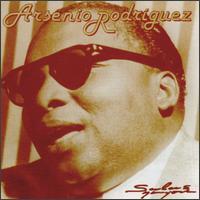

 |
AfroCubaWeb
|
 |
 Discography Arsenio Rodríguez and the Transnational Flows of Latin Popular Music, by David F. García, 9/06
|
Arsenio Rodriguez"Arsenio Rodriguez was a great Cuban bandleader, who reached the
height of his formidable powers during the late 1940s and 1950s. Blinded while a young boy
by a kick in the face from a mule or horse, Arsenio was known as "El Ciego
Maravilloso," the Blind Marvel (or the "marvelous blind guy," for the more
literal among you). Arsenio was born near Union de Reyes in the Province of Matanzas. Arsenio handed over his All Star band to trumpettist Felix Chappotín when he moved to New York in 1948. That group became the Conjunto Chappotín, whose successors, many of whom are relatives of the original musicians, will be touring the US soon. Another sideman, pianist Rubén González, recently toured with the Afro-Cuban All Stars and has cut his own album. Radio Havana's Eugene Godfried points out how one of Arsenio's enduring tunes is "Adorenla como Marti" which deals with the theme of the AfroCuban Mambi fighters in the Army of Liberation at the end of the last century - they formed the backbone of that Army. The title refers to the need to respect the AfroCuban leaders who motivated the masses to struggle against Spain, leaders Arsenio names in his song -- Antonio Maceo, Quintin Banderas, Flor Crombet, Bermudez, and others. He could not say Adorenlos but had to use the feminine to disguise who shouild be worshipped, as he could only go so far in his support of these leaders. David Garcia mentions this song in his book, "Arsenio Rodríguez and the Transnational Flows of Latin Popular Music"
The Club Cubano Inter-Americano is still in existence and described on this site. |
[AfroCubaWeb] [Site Map] [Music] [Arts] [Authors] [News] [Search this site]